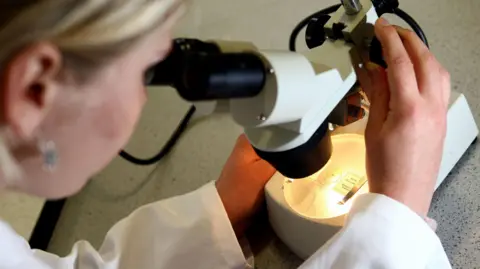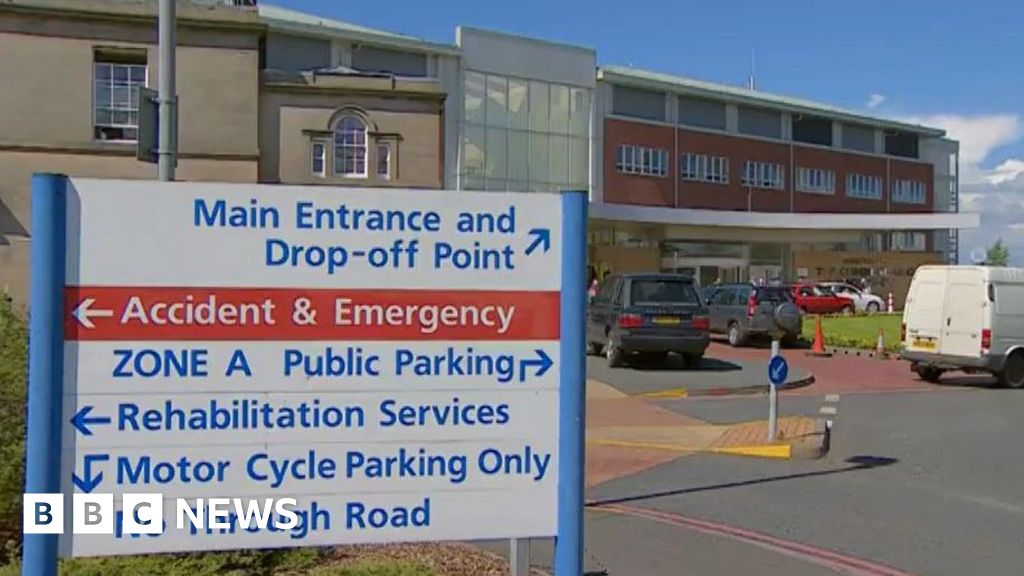Federica BedendoNorth East and Cumbria
 BBC
BBCA coroner has raised concerns over the lack of a skin biopsy service at a hospital, after an 88-year-old woman faced a two-week wait because she needed to be taken to a separate clinic.
Robert Cohen, coroner for Cumbria, said “urgent action” was needed to provide the procedure in-house to patients at the Cumberland Infirmary in Carlisle.
The warning comes following the inquest of Beatrice Smith. While the wait did not contribute to her death, Mr Cohen said it resulted in “less dignity and more delay” in her care.
North Cumbria Integrated Care (NCIC), which runs the hospital, said it was “closer to a solution” and apologised to Mrs Smith’s family.
Mr Cohen questioned why a frail patient with dementia would be put through the stress and “astonishing expense” of being moved from hospital for a routine procedure, which was needed to diagnose the cause of a skin ulcer.
Lisa Cairns, collaborative lead nurse at NCIC, said a dermatology service had been “difficult to recruit for” and demand was growing due to a rise in skin cancer cases.
“This is not the care we would expect to give to our patients,” she told the hearing.
‘Inconsistent’ diagnosis system
Ms Cairns explained “teledermatology” was being used to diagnose cancers. This involved pictures of patients’ suspected skin cancers being sent to specialist teams, with high-risk cases being brought in for a face-to-face appointment.
However, she said the service was “inconsistent”, with some GPs not able to send good enough images.
“We’re probably bringing in 70% more patients than we should be,” she said.
She said more clinicians would be available if the “teledermatology system was working well”.
The most recent figures released by NHS Digital show about 231,000 skin cancer diagnosis were made across England in 2022.
This was up by 7% compared to five years before. The oldest comparable figures, show about 178,800 skin cancers diagnosis were made in 2013, meaning the number has risen by 29% in nine years.
 PA Media
PA MediaMs Cairns said some solutions had been trialled to provide skin biopsies at the hospital, such as dedicated clinicians being present on site at regular intervals, but that had been deemed “inadequate”.
She said the trust was “closer to a solution”, which would involve different specialist teams being on hand to perform the procedure on a rota.
She added concerns over clinicians’ workload were being discussed.
During the inquest, which took place last week, Mr Cohen concluded Mrs Smith had died after developing sepsis from an ulcer on her right foot, which staff at Riverside Care Home in Maryport, where she was a resident, failed to properly manage.
Mr Cohen heard she was discharged to the care home after a five-month hospital stay, where she was being treated for a large ulcer on her other leg. This had almost completely healed by the time she left hospital.
Mr Cohen concluded the care home’s failure to seek specialised treatment for Mrs Smith amounted to neglect and contributed to her death.
During the hearing, care home manager Sarah Nicholson apologised to Mrs Smith’s family and said lessons had been learnt.
A spokesperson for NCIC said although the coroner found the delay in receiving the biopsy did not contribute to Mrs Smith’s death, it was sorry for the delay caused.
“We are actively taking steps to improve access to dermatology services for inpatients who cannot be transported from hospital to ensure we can provide the best care possible to patients requiring this service,” they said.

